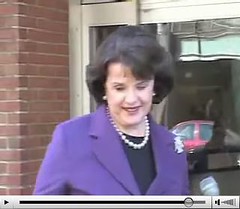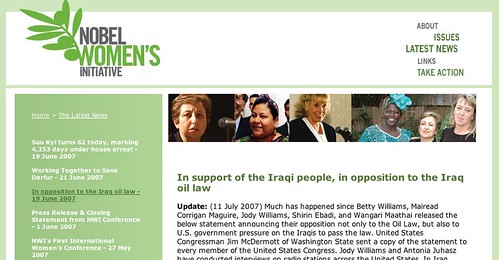This stuff should be front page news, and even though it isn't, people are figuring it out, and demanding windfall profits taxes on oil companies that use our tax dollars and troops to expand their assets and repay us by raising gas prices and giving their execs $400 million parting gifts.
Others like Greg Palast and Naomi Klein have done a good job of covering this, but the story has yet to become part of the mainstream discussion, not even among Democrats and some progressive talk shows like Al Franken, on why we are in Iraq, and if and how we need to leave.
I suspect that why it isn't discussed is that if it was, it would be game over in public opinion since the motive is not access for American consumers and our economy (the Middle East would sell to their biggest consumer no matter what), but access for American oil companies, so they can reap the profits and determine the price and flow.
Two different stories, one from the top CIA oil analyst and another from the minutes of a meeting between Tony Blair and W, indicate Bush invade to keep Saddam from pumping too much oil when the sanction came off and driving price down--we invaded for the privilege of paying MORE for gas.
http://professorsmartass.blogspot.com/2006/04/new-dsm-bush-told-putin-iraq-war.html
The title includes another under-reported aspect of the Iraq War story--that it is a more overt version of what we do on behalf of business in other countries. You can have any kind of government you wants as long as it does drive too hard a bargain for its natural resources, pay it's workers too much, or spend too much on social services like education and medical care (which might require taxing businesses). This system works well for business, but not the rest of us. It's why essentially every country in South America have elected anti-American governments because people are outraged at this economic foreign policy that few Americans have even heard of, neoliberalism, that sounds nice but works in the ugly way I just described.
It also sounds remarkably like what the Bush administration is doing to the US, and gradually getting the same results in public outrage.
A good brief summary of neoliberalism:
http://www.corpwatch.org/article.php?id=376How "economic hit men" set it up and enforce it:
http://www.johnperkins.org/Preface.htmThe Bush Agenda: Invading the World, One Economy at a Time author's website:
http://www.bushagenda.net/index.phpGreg Palast's timeline of Iraq oil meeings (with video interviews with the players):
http://www.gregpalast.com/iraqmeetingstimeline.htmlDetailed report on restructuring of Iraq's oil industry to benefit our oil companies:
http://www.globalpolicy.org/security/oil/2005/crudedesigns.htmColin Powell's chief of staff on oil motive for Iraq War:
http://professorsmartass.blogspot.com/2005/11/powell-aide-says-war-about-oil-so-we.htmlBroader background on oil, war, and foreign policy:
http://www.mymethow.com/~joereid/oil_coup.htmlNaomi Klein on privatization and its effects in Iraq:
http://www.harpers.org/BaghdadYearZero.htmlEconomic war crimes in Geneva and Hague Conventions:
The Hague Convention of 1907 (IV) see articles 47, 53, 55
http://www.icrc.org/ihl.nsf/FULL/195?OpenDocumentThe Geneva Convention of 1949 (IV) we've broken almost every section of article 147, and Bush has personally broken article 148.
http://www.icrc.org/ihl.nsf/FULL/380?OpenDocumentKEY EXCERPTS:

http://www.democracynow.org/article.pl?sid=06/04/25/1343214
Tuesday, April 25th, 2006
Antonia Juhasz on The Bush Agenda: Invading the World, One Economy at a Time
WHO PLANNED THE WAR:
Chevron has seen its most profitable years in its entire 125-year history over the last two years. They are making out like bandits. They have been at the forefront of advocating for decades for increased U.S. economic access to Iraq. And now, they are one of the few companies that are poised once the new oil law is implemented. And that oil law has its history in the U.S. State Department, in the Iraqi Oil and Energy Working Group that formed right before the war.
... At the end of Saddam Hussein's tenure, he had signed about 30 contracts with companies from all around the world to give them access to Iraq's oil sector. None of those contracts were with the United States or U.S. oil companies. The Cheney Energy Task Force, that met at the very beginning of the Bush administration, mapped out foreign suitors to Iraqi oil, listed all of the companies, all of the countries, the fields that they had access to, within a document that said we need --the U.S. needs to get greater access to Middle East oil. [Mike's note: this task force met before 9/11]
AMY GOODMAN: Can you tell us who Cheney met with?
ANTONIA JUHASZ: Cheney met with -- thank goodness for the Supreme Court, that ruled to release these documents, because otherwise they were completely secret. He met with Bechtel, Chevron, Halliburton, Exxon, all of the largest oil companies and all of the largest oil engineering companies, and they decided we need to increase our access to Middle Eastern oil.
****
ANTONIA JUHASZ: Bremer became the dictator of Iraq. His orders laid out the law. Now, probably the most important thing to know is that that was completely illegal under international law. The Geneva Conventions are very specific about what an occupying power should do. It must provide basic security and services. It cannot change the laws or the political structure of the country it occupies. The Bush administration did exactly the opposite -- changed all the fundamental economic and political laws and utterly failed to provide for the security and the basic needs of the Iraqi people. What you hear most often in Iraq today is people saying, “Please just put us back where we were before you came.”
****
OIL PROFITS, PRICE @ THE PUMP, & BUSHIES
AMY GOODMAN: We’re talking to Antonia Juhasz, author and activist, wrote The Bush Agenda: Invading the World, One Economy at a Time. Now, gas is over $3 in many places. What's the connection?
ANTONIA JUHASZ: Well, here's the connection. The Bush administration is the most beholden administration probably in American history to the oil and gas industry. This is the first time in history that the President, Vice President and Secretary of State are all former energy company officials. In fact, both Bush and Rice have more experience as energy company officials than they do as government leaders. Cheney outbeats them. He’s spent 30 years working for government. However, his five years at Halliburton have been so profitable that you might say that his Halliburton years outweigh their oil years, because Bush was a very bad oil company executive. But their links to the oil sector are deep.
The oil industry provided more than 13 times more money to the Bush-Cheney ticket in the first round of elections than it did to his competitor, nine times more in the second. And this industry has been absolutely coddled by the Bush administration: enormous tax subsidies, deregulation, and, I would argue, a war waged on their behalf.
****
AMY GOODMAN: In your chapter "A Mutual Seduction," you have a quote of Ken Derr, the former C.E.O. of Chevron, 1998. I know his tenure well. It was the time in the Niger Delta that Chevron was involved with the killing of two Nigerian villagers, who were protesting yet another oil spill of Chevron and jobs not being given to the local community as they drilled for oil. But your quote here says, “Iraq possesses huge reserves of oil and gas, reserves I would love Chevron to have access to.” And then you follow that by a quote of John Gibson, Chief Executive of Halliburton Energy Service Group, who says, “We hope Iraq will be the first domino and that Libya and Iran will follow. We don't like being kept out of markets, because it gives our competitors an unfair advantage.”
ANTONIA JUHASZ: I love it when they’re honest. It doesn’t happen very often. Yeah, these companies have been explicit, for decades, that they want in, particularly to Iraq. The reason is obvious. Iraq certainly has the second largest oil reserves in the world, but some geologists believe it has the largest, at least on par with Saudi Arabia. That's a tremendous pool of wealth. And not just have the companies been clear that they want access to that oil, U.S. leaders -- for example, Dick Cheney, Paul Wolfowitz, Zalmay Khalilzad, Donald Rumsfeld -- have all been explicit for the past 20 years that what the U.S. needs to do is gain increased access to the region's oil, and most explicitly during the ‘90s, Iraq's oil, that this is something that shouldn’t be in the hands of Saddam Hussein.
The difference, going into the current Bush administration, was that the rhetoric changed to and the reality changed to not just we need a new leader, we need a new -- a fully new political and economic structure in Iraq, and we need to be in that country to make sure that that structure gets put into place. And that is exactly what they have achieved, and now Halliburton, Chevron, Bechtel, Lockheed Martin have profited tremendously from this process already. Chevron’s -- the U.S. value of Iraqi oil, imported Iraqi oil, has increased by 86% between 2003 and 2004. Those profits have gone to Exxon, Chevron and Marathon.
http://www.democracynow.org/article.pl?sid=06/04/25/1343214
economic hit men neoliberalism iraq war Bush Agenda: Invading the World, One Economy at a Time greg palast oil Colin Powell president george w bush osama bin laden Hague Convention Geneva Convention privatization dlc bechtel chevron exxon mobil corruption occupation halliburton Paul Wolfowitz colonialism white mans burden professor smartass naomi klein donald rumsfelddick cheney peak oil propaganda corporationfascismdemocracy now war on terror foreign policy false flag northwoods worst president ever failure war criminal idiot retard closet gay smartass comments resistance censored news rebel






 In depth study compares
In depth study compares











